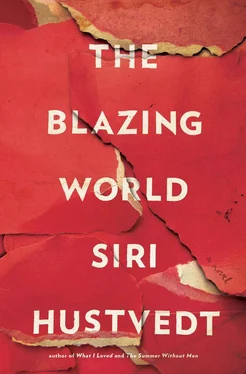I have only one personal note to contribute. When I saw The History of Western Art , supposedly the work of Anton Tish, at the Clark Gallery, I was struck by a passage etched into Venus’s inner thigh:
Have not girls done as much for the doll? — the doll — yes, target of things past and to come? The last doll, given to age, is the girl who should have been a boy, and the boy who should have been a girl! The love of that last doll was foreshadowed in that love of the first. The doll and the immature have something right about them, the doll because it resembles but does not contain life, and the third sex because it contains life but resembles the doll.
It is from Nightwood by Djuna Barnes, a difficult, strange little novel. To be honest, I am not at all sure what is meant by this meditation on dolls, but I do know that in not one but in three of the works in her second show, Burden included quotes from that particular book. No one has exclusive rights to quote from Nightwood . Still, it struck me as curious, and then, when I looked inside the boxes that circled the large Venus sculpture, the little scenes bore such strong similarities to Burden’s early rooms with their small figures and oblique narratives that I felt sure Tish must have seen her pieces. Influences are normal, but these looked like the development of that earlier work, and I was bothered by the thought that he might have looted from works she had never shown. Not a single reviewer mentioned Burden.
Through the son of a friend who knew Burden’s daughter, I got the artist’s telephone number in Brooklyn and called her. I introduced myself, explained the nature of my call, and asked her if she had been to the gallery to see the show, to which she answered, “No.” I discovered later that this was technically true. I then asked her if she was still making art. She said, “Yes.” I waited for her to say something more, then elaborated further, saying that aspects of the work seemed so close to hers that I found it alarming. There was a long, awkward silence. I could hear her breathing. Finally, she cleared her throat and then said, “Thank you. Thank you for calling. Goodbye.”
That was it. I had given her an opening. She didn’t take it. Harriet Burden had allies. I count myself among them. I am convinced that had she looked for a dealer, she would have found one, but even if she hadn’t, she could have taken another route. There are women’s cooperatives that show artists who fail to receive recognition from mainstream venues. I have seen some very good work exhibited in those galleries. Burden wanted her experiment, and she wanted to remain hidden. I can’t help but wish that she had been able to answer me then. At the same time, the masks must be considered as furthering what she did best — creating works of focused ambiguity.
Bruno Kleinfeld (written statement)

I met Harry during a dog-eared, smudged, scribbled-in-the-margins, stained, and torn chapter of my life. But that was a cosmetic problem, really. I am the proud owner of any number of tattered and beaten biographies that are still decipherable. Time creeps. Time alters. Gravity insists. As my mother used to say to me, “After fifty, Bruno, it’s just patch, patch, patch.” No, it wasn’t my going-on-sixty carcass with receding hairline and basset-hound cheeks that made that chapter so bad. It was that I had lost me. I was no longer the hero of my own life. Instead, I was lurking in the proverbial shadows as some goddamned minor character with only a couple of lines of dialogue here and there. Imagine getting up in the morning and scouring the apartment for yourself, turning out drawers and rifling through closets and checking under the bed for yourself. Where had I mislaid him, that bright, curly-headed youth with prospects shining just over yonder hill? Whatever happened to Bruno Kleinfeld? You may well ask. My person seemed to have sidelined itself in ways that meant I was no longer I. The imposter, Bruno Kleinfeld, the one who woke up in the morning in the ratty apartment in Red Hook, would have been a big surprise to the actual Bruno Kleinfeld, who was traveling boldly from one chapter to another in his fully authorized biography. But I simply couldn’t lay my hands on that Bruno and found myself stuck with the former, a sad sack who regularly ate Spaghetti Os for dinner and twice in desperation descended to gourmet tidbits for the doggy set. You see, he couldn’t pay his rent and had to go panhandling to his old friend Tip Barrymore in Park Slope, whose brownstone life looked far more like the one the genuine Bruno was living. Eyes. It’s all in the eyes. Tip’s eyes when he said he didn’t need it back. “I don’t need it back, Brune.” Brune is the only way to shorten Brun-O. Pupils askance, furtive, not straight double-barreled, not man to man. Poor Brune. He didn’t say it. Oh no. His eyes said it. Pity the bright boy of yonder hill? What the fuck? You’ve got the wrong guy, bub, the wrong Brun-O, old man. Take it on the chin. Take it in the gut. Garçon! Bring me a glass of the Fronsac and the steak frites tout de suite . With mayonnaise! Little dreams of meals. Little dreams of no roaches, of a smoothly working, rust-free toilet, of linoleum without chips and yellow stains. The sad little dreams of the poseur, that fake Kleinfeld of swollen proportions and disabled swing with no pop. Who was that guy that used to hit them over the fence, used to speed around the bases, used to be a schmooze artist, ladies’ man, seducer, used to be husband to three women and father to three daughters, promising author of two books of poetry, published by a major press, major, not minor (verses in minor key but not of the minor leagues), with tributes from luminaries plastered on back covers with that significant word he had relished, chewed over, sucked on long and hard: Whitmanian ? The kid’s work is “Whitmanian,” and there were no less than three exclamation marks that ended sentences inside those blurbs by notables of international reputation, emphatic punctuation for emphatically bright boy who raked in grant money on strength of looming hill yonder, young, handsome poet whippersnapper who begins epic poem, poem for the ages, the poem to end all American poems.
And he writes, and he writes, and he writes, and then he writes it again, and he cannot get it just the way he wants it. And as he writes it, the years pass; he marries and divorces, and he marries and divorces again and then again; children are born, and he is still writing the poem, and he cannot get it the way he wants it. Sometimes he can’t see it anymore. He is under the poem, and it is threatening to crush him. He wants the bullshit out of it; don’t you see? B.K. hopes to purify MS. of all B.S. and climb said hill, and he cannot get over it. There are days when he feels he is pushing the poem toward the top, and he can almost see the other side, but then, like Sisyphus, he cannot get it to roll over the summit.
And so one morning in October, the false Kleinfeld is gently easing a turd from his aged ass into poorly functioning toilet bowl in aforementioned rat hole with the window shade slightly raised for viewing traffic below and large warehouse building across the street, where renovations have been underfoot for quite some time, and he sees her again, the woman he has seen often, nearly every day for many months, and has heard tell about, the tall, striding woman with a pair of tits that make his heart stop. There she is again in another coat, a fern-green number with wide sleeves and some kind of built-in scarf that sweeps over her shoulder. Kleinfeld has an idea that the woman has a closet with nothing but coats in it and another for boots, since those changed, too. She is wrapped up daily, he thinks, in the magic of money, which means simply this: You can tell she isn’t thinking about the coat or the boots; they just are. The poor wear their prizes — the gleaming new leather shoes, the just-off-the-rack sweater, the expensive gloves — with a stiff self-conscious air that gives them away. No, her mind is on greater things, he says to himself. You can tell by the little V between her eyebrows, a philosophical wrinkle, he believes, not a run-of-the-mill V carved in deep by sick worry about rent money and groceries. Hadn’t he spied her once, quite by accident, on the remote F train reading Schelling? God help us, the woman was reading Friedrich von Schelling on the F as calmly as if she were gliding through the Daily News . The old Bruno, the speed demon, had looked into Schelling once as an undergraduate and had taken a bad fright, equaled only by his opening up the Phenomenology of Spirit by Georg Wilhelm Friedrich Hegel, who also scared the boy witless. This was not some regular dame. No, this was a doll with high tastes, with ideas dancing in her head like fireflies. The lady’s hair was a jumble of curls and her eyes were big and wide and dark, and she had a long neck and wide, square shoulders, and that day, that October morning, as she crossed the street below him, just as she had crossed it many times before, he saw something vulnerable and hurt cross her face that came like a breeze and, as it blew, she suddenly looked very young. Her mouth, her brows, her eyes all contributed to the expression, which didn’t last long, but it seemed to Kleinfeld’s double, sitting there on the pot, boxers around his ankles, that the pain he had seen and she had felt had come and gone with a single grievous thought about someone.
Читать дальше













